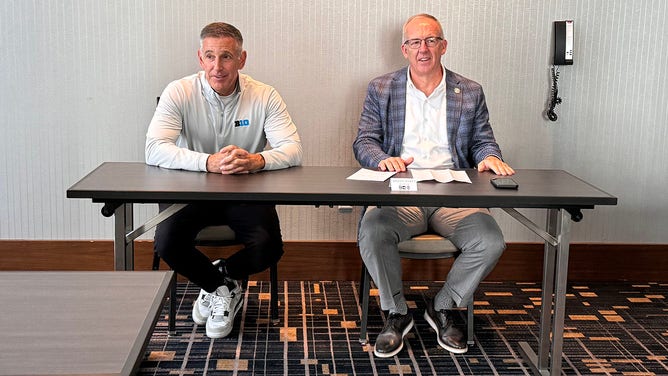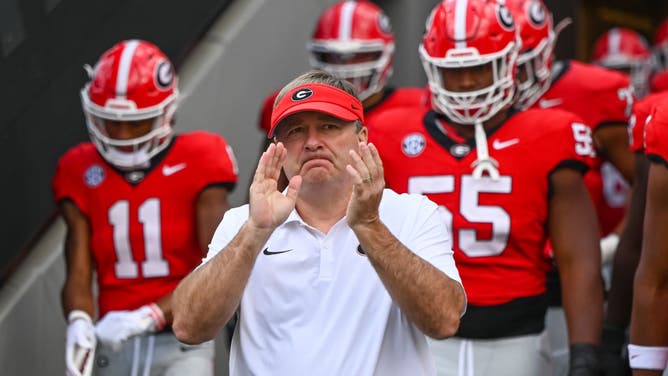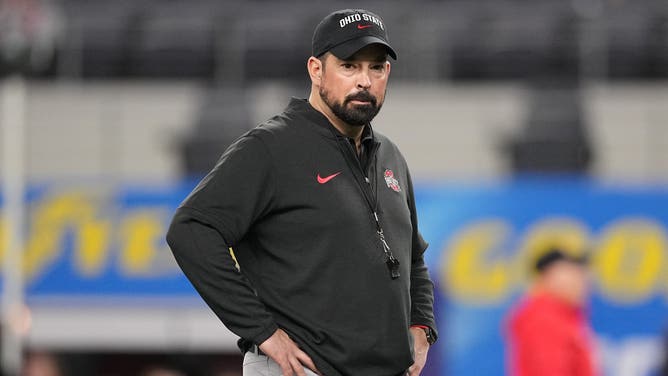Nashville Meeting Makes It Clear: SEC, Big Ten Will Lead Upcoming Changes In College Athletics | Trey Wallace
NASHVILLE, Tenn. — After arriving on Wednesday night for a full day of conversations surrounding the future of college athletics, athletic directors from the SEC and Big Ten are heading home with a few different ideas.
You can sum up the meeting in Nashville as a massive think-tank for leaders across the two biggest conferences in the country. Each school did not plan on walking into these meetings and sharing their secrets on how they will approach raising money or what their revenue stream will look like moving forward, but they were at least able to give a broad idea of how they would approach this new era.
But let's be clear: this was also a show of force towards different conferences around college athletics, and made it clear that they have a ‘defined role’ in the college football playoff.
After a dinner on Wednesday evening that included all 34 athletic directors, the meeting on Thursday in downtown Nashville was a way for these leaders to start interacting, even if it meant looking ahead to potential scheduling opportunities down the road.

SEC Commissioner Greg Sankey, along with Big Ten commissioner Tony Petitti meet with selected reporters on Thursday in Nashville Via: Trey Wallace
Conversing with a number of athletic directors on Wednesday night, you could tell there was a sense of understanding of what needed to be done to pay for what was to come, especially as schools start bringing their revenue-sharing in-house. How are some of the schools going to pay for the potential $22 million salary cap that’s coming next summer? There have already been some schools in the SEC that have implemented certain strategies.
Take for instance, the University of Tennessee, which added a ‘talent-fee’ to its season ticket packages that will start next season. This money will be used to help the school pay student-athletes, along with finding the off-set money needed that isn't coming from the conference, or contracts from the college football playoff contract.
Another tactic was Georgia deciding to raise season ticket prices, but not enough to scare donors away. Also, the school will be putting non-conference games and SEC games into the same ticket price level. In the past, schools have lowered prices for games that aren’t in-conference, but that will change moving forward, as every game will cost the same.
This is just one way that some schools are trying to raise money to help pay for this new era, with more ideas coming.
Further Regular Season Scheduling Between Big Ten, SEC
As we have seen this season, the SEC and Big Ten have not shied away from playing each other, and not just in an opening game that is put on by a third-party. In discussing what the future could look like in terms of more games between the two conferences, both commissioners discussed how they would try to continue that relationship.
Big Ten commissioner Tony Petitti pointed out that the athletic directors are working together for a way to continue this relationship. Besides playing in the bowl games, and the relationships they have in the current non-CFP games, there is an opportunity to continue that growth, with more matchups like we've seen this season between Texas and Michigan, Alabama and Wisconsin, LSU and USC and so on.

SEC Commissioner Greg Sankey, along with Big Ten commissioner Tony Petitti meet with selected reporters on Thursday in Nashville
The likelihood of this continuing is high, especially since the athletic directors have brought the subject up numerous times to their commissioners.
"I think part of the discussion is about those games happening organically on-campus," Tony Petitti mentioned. "Our athletic directors are having conversations typically. The question is whether there is a structure where the two league offices work together to try and create more of those matchups. We've had discussions about how we can play each other more, and how many, and if. There is a right way to do this.
And if you're wondering if fans will have to wait ten years for these games to be scheduled, Tony Petitti said that there was more wiggle room.
"I think there's more flexibility than 10 years. We don’t have to wait 10 years to do this. There are other ways to do it," Tony Petitti noted.
College Football Playoff Format In The Future Was A Major Topic
The main concern about where we are headed in the future, is actually making sure the 12-team playoff gets off the ground without any hiccups, which should obviously be the case. But there's clearly been chatter about how much growth will occur over the next few years, as we inch closer to 2026.
For SEC commissioner Greg Sankey, he made it clear that before worrying about how things will work out in the future, they need to make sure everything goes as planned for the current model.
"Our focus on future format will come after we go through this cycle of the college football playoff," Greg Snakey said about where their conversations will go in the future. "Not a lot of conversations about what-ifs, this just had to go incredibly well, this has to be a successful launch. This isn't the time to talk about format or governance in 2026."'

ATHENS, GA - OCTOBER 05: Georgia Bulldogs head coach Kirby Smart brings the Georgia Bulldogs team out of the tunnel during the college football game between the Auburn Tigers and the Georgia Bulldogs on October 5, 2024, on Dooley Field at Sanford Stadium in Athens, GA. (Photo by John Adams/Icon Sportswire via Getty Images)
A lot of the future actually centers around the operation of the games, and who's in charge of making sure everything is in-place for when needed in the postseason.
The simple fact is that the SEC and Big Ten will have an exorbitant amount of power when the next negotiations for the playoffs commence, and the timeline on getting to fourteen teams.
Are The Big Ten And SEC Worried About Private Equity? Not At All
One of the major talking-points over the last few months, as revenue-sharing draws closer and the ‘House’ settlement is finalized, centers around the amount of money needed by every athletic department to keep up with their peers.
But as we have seen over the last several weeks, a number of private equity firms have floated the idea of getting involved in college sports, especially with how much money is going to be spent on revenue sharing, by this time next year.
For Big Ten commissioner Tony Petitti, he's not playing the game of bringing in hedge funds to insure equity in athletic departments around their conference.
"I have yet to see a single thing, in any plan that I have learned details about, that contains things that we couldn't do ourselves," Petitti mentioned about private equity. "I don’t see anything that's proprietary that we would need that someone else controls to do what they're talking about. Basically, schedule more good games and reorganize the way you play those games."

ARLINGTON, TEXAS - DECEMBER 29: Head coach Ryan Day of the Ohio State Buckeyes looks on prior to a game against the Missouri Tigers during the Goodyear Cotton Bowl at AT&T Stadium on December 29, 2023 in Arlington, Texas. (Photo by Sam Hodde/Getty Images)
Simply put, the Big Ten is collectively saying that they don’t need some New York hedge funds money to make sure their future is bright, they can do it on their own. Whether or not that will stick down the road is up for discussion, but from the way Tony Petitti was talking about his conference, there's no need to muddy the waters.
Greg Sankey took another approach, mentioning that he did not think it was a coincidence that further discussions about the potential need for private equity came on the day before they met in Nashville.